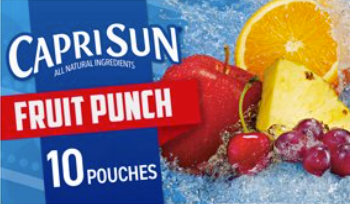Fruit drinks, as opposed to 100% fruit juice, are a no-brainer. They are heavily sugar-sweetened, and best consumed in very small amounts or not at all.
They are difficult to distinguish from 100% fruit juice. Their labels make them look fruity and juicy.

So do their ingredient lists:

But these are juice concentrates and require translation: added sugars. In this case, 11 out of the 13 grams per serving.
Public health advocates want to discourage parents from buying sugary beverages for their kids. Here are the results of one such attempt.
As the accompanying editorial, Warning: Don’t Let the Beverage Industry Harm Your Kids, explains,
Unlike general social marketing or other communications campaigns, countermarketing is designed “to reduce the demand for unhealthy products by exposing the motives of their producers and portraying their marketing activities as outside the boundaries of civilized corporate behavior”…Let’s put this good news to use by placing responsibility at the feet of the platforms and companies profiting from directly and incessantly targeting children with marketing the food and drink they should avoid.
If you would like to know how this works, here’s a toolkit for campaigns against fruit drinks.
One additional observation was a reduction in purchases of 100% juice, probably because it is so hard to tell the difference without careful scrutiny of labels (hint: look for 100%).
100% juice is a better option than fruit drinks (fruit is the best option), but still sugary because so many pieces of fruit go into it.
The juice industry is plenty worried about decreasing sales. Marketing materials sent to dietitians reveal the concerns. Guess who paid for these messages—and the studies.
Hot summer temperatures combined with a population eager to get outside and get moving means risk of dehydration is high. In addition to water, consider including 100% juice as a healthy, nutrient dense beverage option. In addition to rehydration and increasing fruit intake, two new studies show 100% juice has many other health benefits.
- A recent UK study published in Nutrients found moderate consumption of 100% fruit juice, which aligns with the US Dietary Guidelines, does not increase the risk of obesity, type 2 diabetes, cardiovascular disease or poor glycemic control. Furthermore, regular daily consumption of 100% juice, may confer health benefits related to vascular function and reduced blood pressure. Emerging evidence shows there may even be a positive impact on cognitive health. [Funding: This research was funded by an unrestricted grant from the Fruit Juice Science Centre].
[Funders: a consortium of orange producers, juice manufacturers and packaging companies based in Europe and Brazil under the umbrella of the European Fruit Juice Association (AIJN)].
- A second review study, published in Frontiers in Immunology, found that citrus juice, contains key nutrients and bioactive substances that help our immune system to work efficiently and reduce inflammation. [Funders: a consortium of orange producers, juice manufacturers and packaging companies based in Europe and Brazil under the umbrella of the European Fruit Juice Association (AIJN)].
And how do we know this is all about marketing? Try this Infographic: Squeeze More Profits From Juices.
Reference: For a summary of research on the “funding effect”—the observations that research sponsored by food companies almost invariably produces results favorable to the sponsor’s interests and that recipients of industry funding typically did not intend to be influenced and do not recognize the influence—see my book, Unsavory Truth: How Food Companies Skew the Science of What We Eat.




